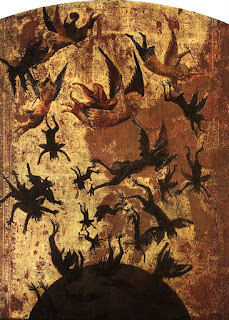Insurgent Angels in the Louvre
Master of the Rebel Angels, detail, 1340-1345, tempera and gold on canvas on wood, 64x29 cm Louvre
Long, long before the creation of the Universe, so tell the tales, Lucifer - "lightbearer," and most beautiful of all the Archangels - rose up against the Creator, and a host of lesser angels joined his insurrection. Michael the Archangel along with his host cast them out of the Empyrean sphere.
(Some even say that God in his infinite mercy created Hell as a refuge for his beloved Lucifer but that it was Lucifer's own heart that made it a place of suffering, devoid of love. To which, according to Milton in the 17th Century, Satan thought: "The mind is its own place, and in it self/ Can make a Heav'n of Hell, a Hell of Heav'n." After the earth was created some of the angels who refused to take sides either way found haven there, between Heaven and the nether regions. These they say, are the fey folk and will o' the wisps of which the wayfarer must beware).
A Siennese painter in the papal Avignon of the 1340s captured this scene. He shows us the angels-turned-demons somehow tumbling through this flat golden plane of non-space with their bat-like wings (one cannot help but think of a certain army of flying monkeys), as Michael banishes them from God's home dominion.
His native training would have inculcated in him a long apprencticeship in both goldsmithery as well as the delicacy of miniature work. These specialities of the Siennese visual tradition are so perceptible in this work, the outline of wings and claws and horns almost etched against the gold leaf in finest tracery. One imagines handling a brush with a single hair. So perfect is his rendering that he has utterly mastered these unruly devils.
The artist's name has been lost to history, as those of so many others. Often we know them by some defining mark or work of the painter. "Master of the High Foreheads" or "Master of the Blue Crucifix." Yet if all written trace of my given name were to be erased from records, I think there could be far worse fates than to be known to further generations, centuries and centuries forth, as "The Master of the Rebel Angels."
Is this the Region, this the Soil, the Clime,
Said then the lost Arch-Angel, this the seat
That we must change for Heav'n, this mournful gloom
For that celestial light? Be it so, since he
Who now is Sovran can dispose and bid
What shall be right: fardest from him is best
Whom reason hath equald, force hath made supream
Above his equals. Farewel happy Fields
Where Joy for ever dwells: Hail horrours, hail
Infernal world, and thou profoundest Hell
Receive thy new Possessor: One who brings
A mind not to be chang'd by Place or Time.
The mind is its own place, and in it self
Can make a Heav'n of Hell, a Hell of Heav'n.
What matter where, if I be still the same,
And what I should be, all but less then he
Whom Thunder hath made greater? Here at least
We shall be free; th' Almighty hath not built
Here for his envy, will not drive us hence:
Here we may reign secure, and in my choyce
To reign is worth ambition though in Hell:
Better to reign in Hell, then serve in Heav'n.
But wherefore let we then our faithful friends,
Th' associates and copartners of our loss
Lye thus astonisht on th' oblivious Pool,
And call them not to share with us their part
In this unhappy Mansion, or once more
With rallied Arms to try what may be yet
Regaind in Heav'n, or what more lost in Hell?
John Milton 1608-1674
Paradise Lost, Book I, Lines 221-270




Comments
Post a Comment